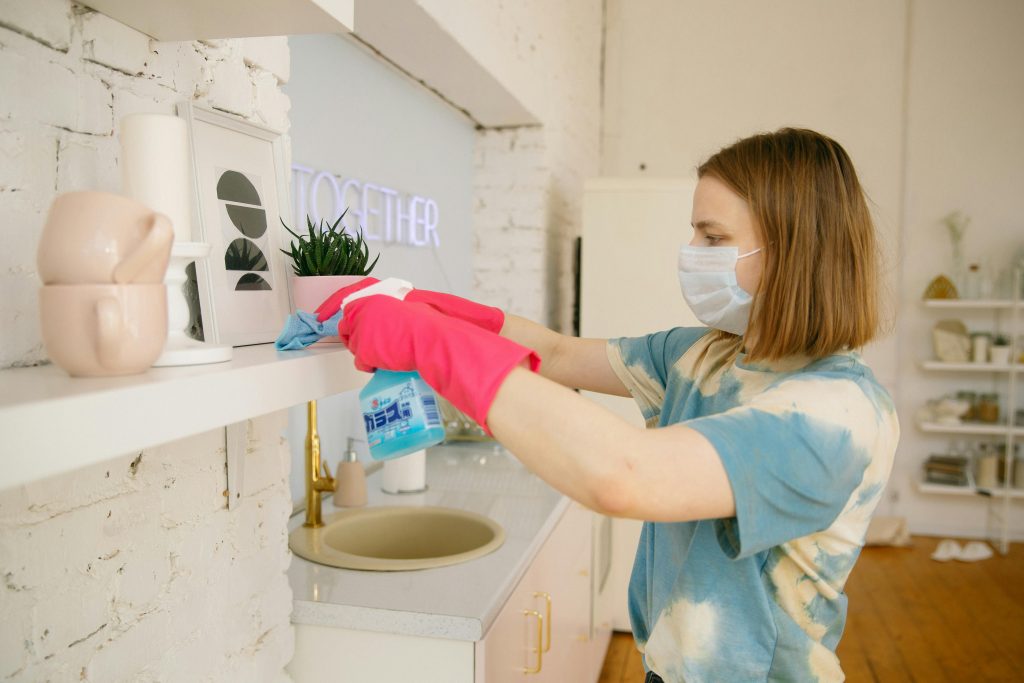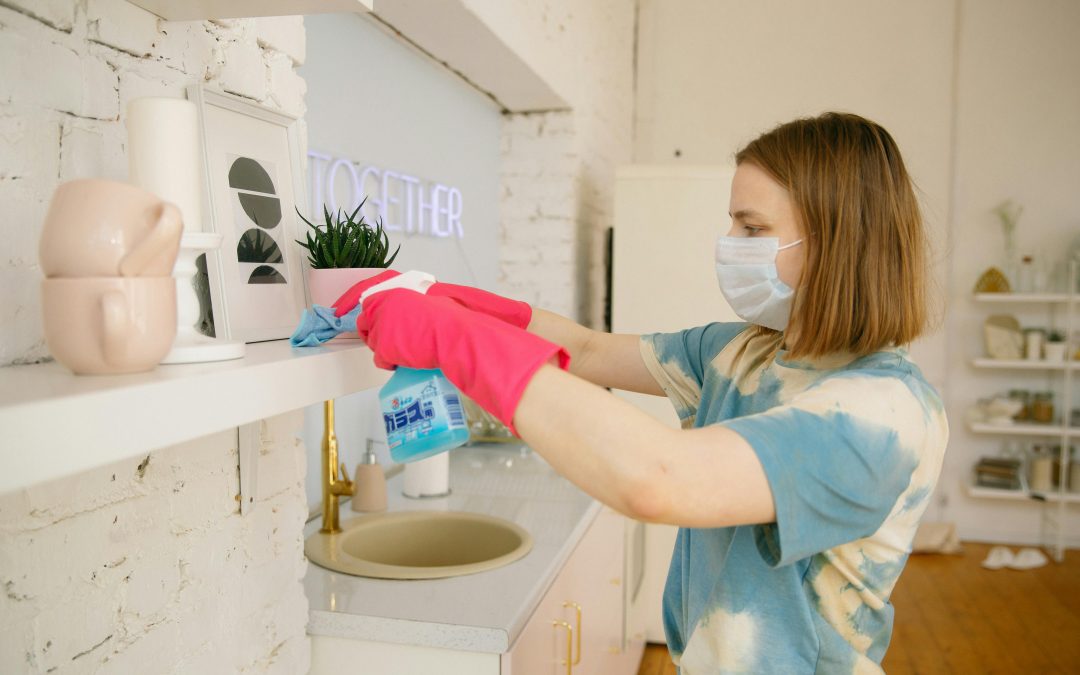Maintaining a clean home year-round is essential. A tidy space ensures sanitation and leaves a positive impression if friends or family drop by unexpectedly. During flu and cold season, many are particularly motivated to clean more thoroughly to combat viral infections. Ultimately, regular cleaning and disinfection are vital for the health and well-being of you and your family.
What do the terms cleaning, sanitizing and disinfecting mean?
The terms cleaning, sanitizing, and disinfecting are often used interchangeably when talking about cleaning, but they mean different things. Here is what each of them means:
- Cleaning refers to removing dirt and grime that is visible on a surface by scrubbing it with water and soap.
- Sanitizing refers to removing germs from a space. First the surface is cleaned and then sanitized by bleach solutions or sanitizing sprays.
- Disinfecting is making sure to kill germs on a surface or an object. This is usually done with bleach solutions or disinfecting chemicals. You should always make sure to clean the surface before disinfecting it.
Why would you need to sanitize or disinfect your home?
Sanitizing and disinfecting your space do not have to be included in your regular cleaning routine. This is because cleaning with soap and water is enough to get rid of germs and bacteria and it is safe on most surfaces. Disinfecting and sanitizing are usually needed when:
- Someone in the household is sick
- You visited someone who is sick
- You live with someone who has a weakened immune system
It is always best to properly sanitize and disinfect your home so you can get rid of disease-causing agents including viruses and bacteria.
What are some benefits of cleaning and disinfecting your home?
If you regularly clean and disinfect your home, you can keep dust, dirt, grime and even mold at bay. There following are other benefits to cleaning and disinfecting your home:
- Getting rid of viruses:
When you remove germs and bacteria from your home, it can prevent your family from getting sick. If someone in your home was sick recently, it is important to disinfect so you can keep others in your home from getting the same illness. This includes viruses such as cold, flu, RSV etc.
- Making indoor air quality better:
If you routinely remove dust from your home, the air quality will improve. This is great for those that have asthma, allergies, etc.
- Reduction of stress:
When you maintain, organize, and clean your home, it will help you have a clear mind and reduce stress.
- Take advantage of quality sleep:
When your home is clean, including your bedroom, you can get better quality sleep.
- Become active:
Cleaning activities such as vacuuming, sweeping, and mopping are physical activities that can give you a little exercise, though they do not typically raise the heart rate. Doing additional simple exercises like lunges after cleaning can help you get better exercise.
- Try to prevent accidents:
Keeping floors and stairways clutter free can help prevent slips and falls.
Now that we’ve gone over why you should clean and sanitize your home, let’s talk about some tips on how to do so.

To determine the best cleaning and disinfecting products for your home, consult the CDC and the U.S. Environmental Protection Agency’s database of antimicrobial products.
How to Clean and Disinfect Your Home Properly
When cleaning and disinfecting your home, it’s important to ensure that your efforts—vacuuming, dusting, spraying, and mopping—are effective. Here are some tips to help you clean and disinfect your home effectively:
- Your hands should be kept clean:
To keep germs out of your home, prevention is key. Frequently washing your hands is crucial, as hands can introduce bacteria into your living space. Touching your face or mouth with unwashed hands can transfer bacteria, potentially leading to illness. When cleaning, wear gloves to shield your hands from chemicals. Don’t reduce hand washing in winter, despite its tendency to dry out skin. Instead, apply lotion for moisture. Between washes, use a hand sanitizer containing 60-95% alcohol to maintain hygiene.
- Disinfect your phone regularly:
Throughout the day, your phone is frequently handled and can become contaminated with harmful microbes. We always have our phones with us, so they collect germs from every place we’ve visited. To disinfect, simply use a lint-free cloth with a solution of equal parts water and isopropyl alcohol. Ideally, your phone should be disinfected daily, or at least weekly.
- Make frequently used areas the focus:
High touch areas such as doorknobs and fridge door handles should be disinfected daily or every few days. It is also important to disinfect toys and electronics, especially during winter months as the flu virus can live on them for several hours.
- Take off your shoes once you are home:
Our shoes often carry germs into our homes. To prevent this, remove your shoes as soon as you enter. Placing a shoe rack near the entryway provides a convenient spot for guests to store their footwear. This practice is especially important if someone in the household has allergies, as it can reduce the need for frequent mopping and sweeping.
- Use the proper cleaning products:
Make sure you have the appropriate sponges, rags, and mops for each task, and wash them in boiling water to disinfect. If disinfection isn’t your preference, opt for disposable items like paper towels or disinfectant wipes.
To determine the best cleaning and disinfecting products for your home, consult the CDC and the U.S. Environmental Protection Agency’s database of antimicrobial products. Avoid mixing products without prior research. Alternatively, consider making your own cleaning solutions.
- Do your laundry regularly:
Try to do one load a day so that you can keep up with your laundry. This includes clothing and items that are touched a lot such as throw blankets, duvet covers, bath towels, bathmats, dish towels, etc. Make sure to use a hot water cycle so you can remove the germs.
- Clean after cooking:
Once you are done cooking, make sure to clean up. Don’t let the mess linger. Always put the leftovers away, do the dishes, load your dishwasher, and clean the countertops. Cleaning your kitchen regularly will help you avoid foodborne illnesses. Also, make sure to clean the high-touch areas such as your kitchen table and refrigerator.
- Make cleaning easy:
Always keep disinfecting wipes, dust cloths, and even a vacuum nearby so you can grab them easily. This will allow you to clean up faster. You can also do something you enjoy while you clean such as listen to your favorite music or an audiobook.
When should you disinfect your home?
Each household is different and a cleaning schedule that works for one may not work for another. Make sure to put aside some time during the week so you can complete your cleaning chores. You can also choose to do two chores per day, so they do not pile up. When you wake up to a clean home, it will make you feel much better.
Even though there is not a sure strategy that will keep germs and bacteria from your home, you should always try to keep them at bay as much as possible. This means cleaning and disinfecting your home as needed so that you and your family can feel comfortable.
Professional Disinfection Services
Are you in need of professional disinfection and sanitization services at your home or business? Our professionals at ServiceMaster S&R Systems provide disinfection and contamination cleaning. We are equipped with the right tools and techniques to swiftly and effectively clean your space. Our highly trained technicians use EPA-registered products to ensure your property is treated with care.
For professional disinfection services in the western Chicago suburbs, give us a call at (630) 896-0030.

